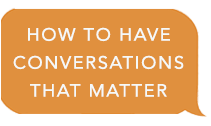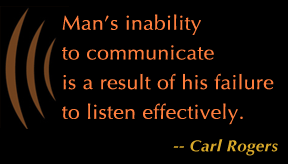
NYTImes opinion columnist David Brooks writes about the art of connecting, even in time of dislocation. His list of “non-obvious lessons for how to have better conversation, which I’ve learned from people wiser than myself,” are applicable to non-Covid times as well.



 Many years ago I attended a powerful and memorable Reflective Listening workshop. The participants were asked to listen carefully as volunteers related a story about something in their lives the found disturbing or confusing. During the first stage of the exercise, the participants were instructed to warm-up their “listening muscles” by listening without any response or reaction whatsoever.
Many years ago I attended a powerful and memorable Reflective Listening workshop. The participants were asked to listen carefully as volunteers related a story about something in their lives the found disturbing or confusing. During the first stage of the exercise, the participants were instructed to warm-up their “listening muscles” by listening without any response or reaction whatsoever.